Unit 10 I'd like some noodles Period 4 Section B (2a-2c)课件(共45张PPT)
文档属性
| 名称 | Unit 10 I'd like some noodles Period 4 Section B (2a-2c)课件(共45张PPT) |
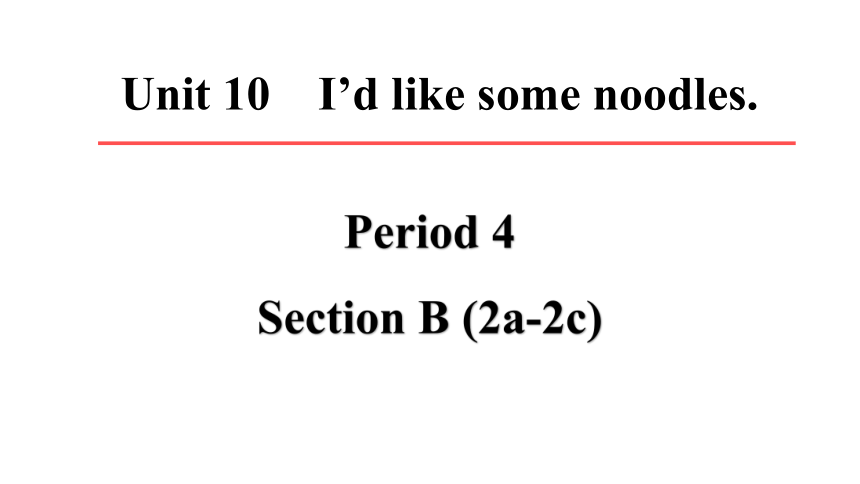
|
|
| 格式 | pptx | ||
| 文件大小 | 17.0MB | ||
| 资源类型 | 教案 | ||
| 版本资源 | 人教新目标(Go for it)版 | ||
| 科目 | 英语 | ||
| 更新时间 | 2023-12-17 00:00:00 | ||
图片预览

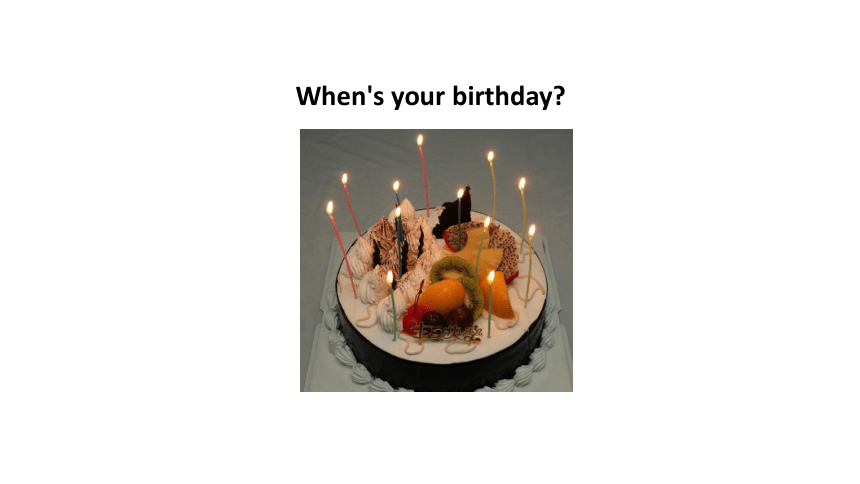
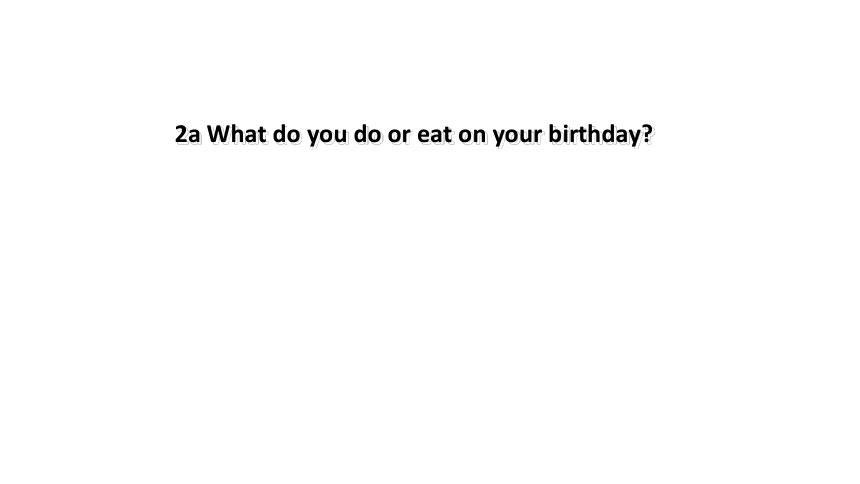
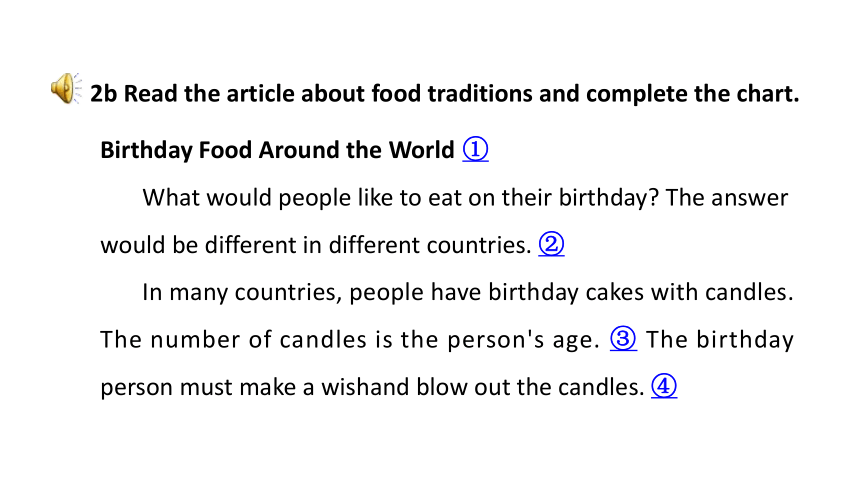

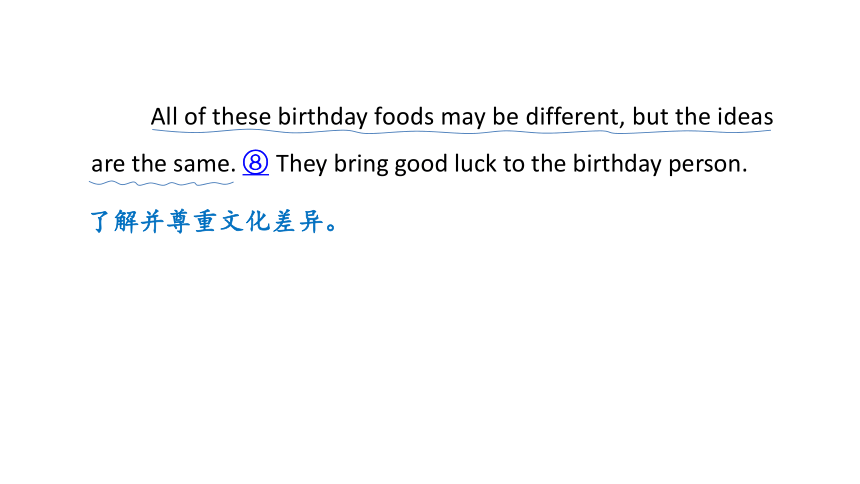
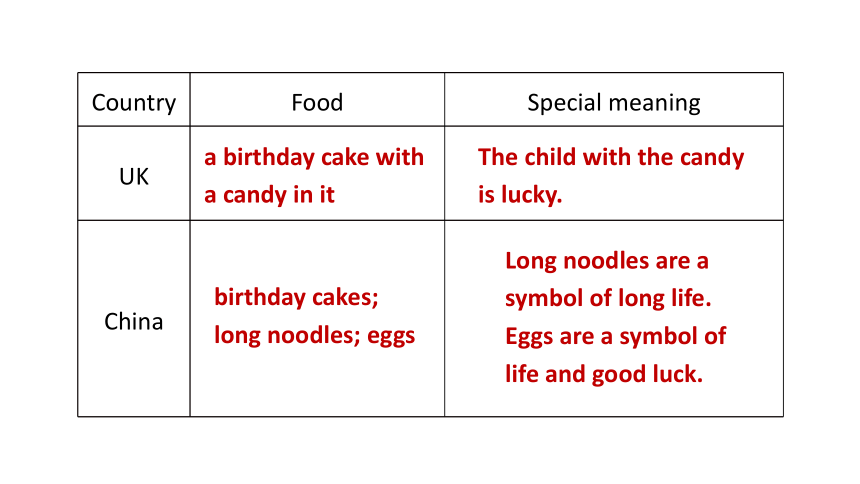
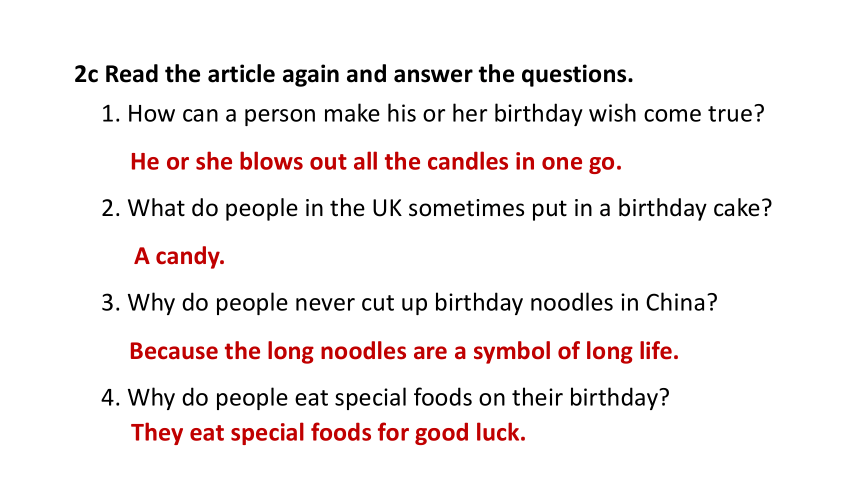
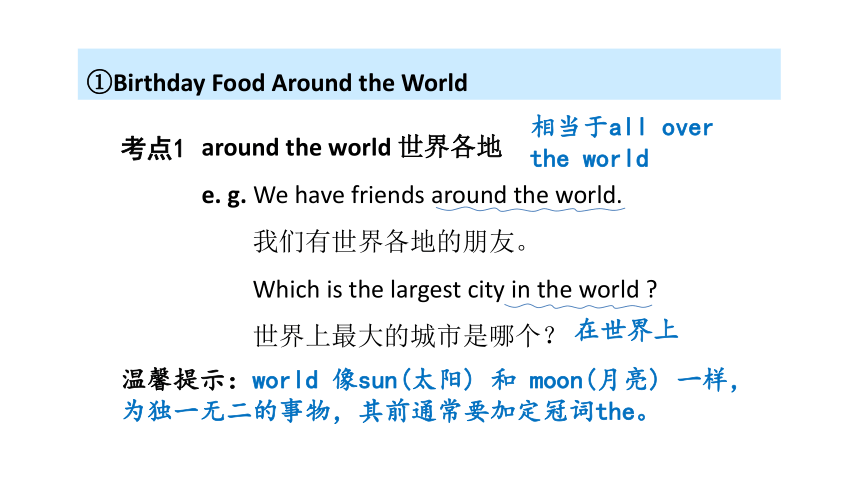
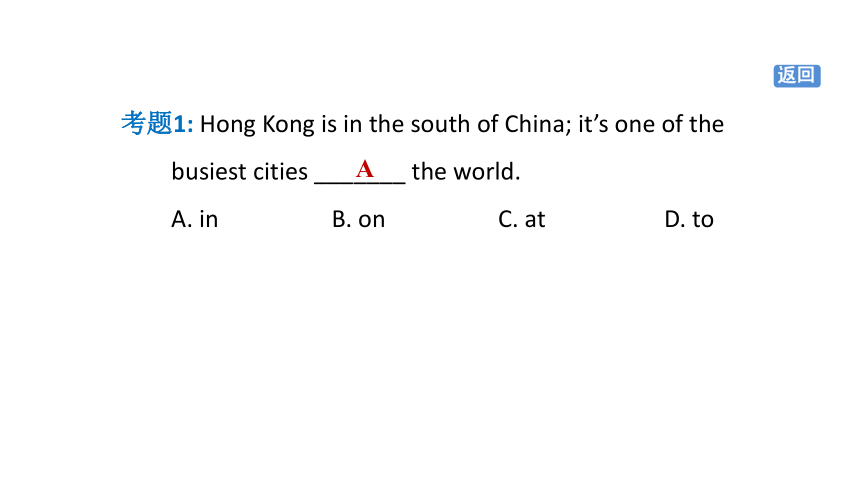
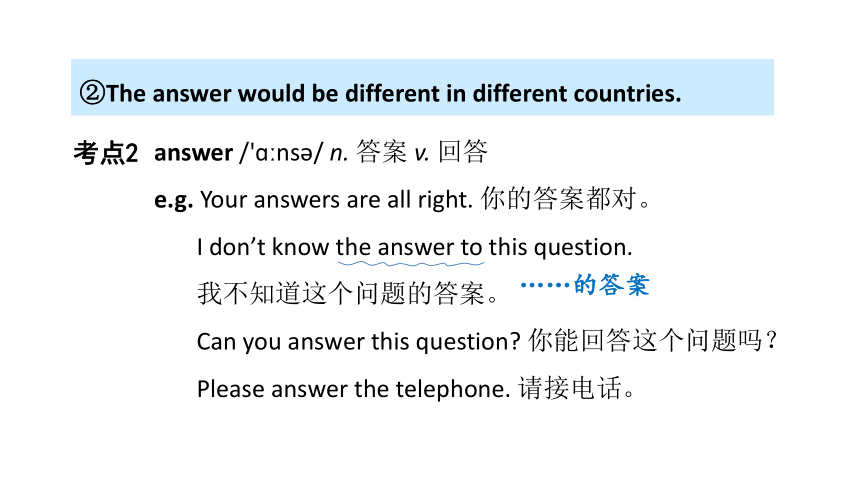
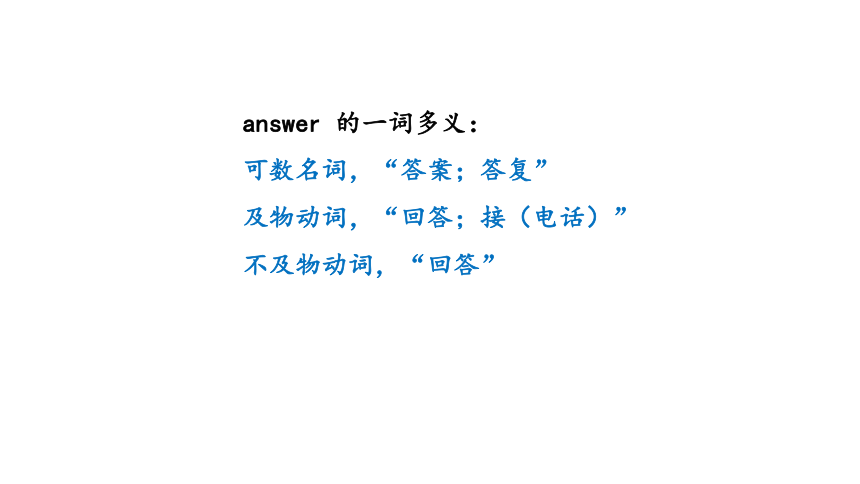
文档简介
(共45张PPT)
Period 4
Section B (2a-2c)
Unit 10 I’d like some noodles.
When's your birthday
2a What do you do or eat on your birthday
2b Read the article about food traditions and complete the chart.
Birthday Food Around the World ①
What would people like to eat on their birthday The answer would be different in different countries. ②
In many countries, people have birthday cakes with candles. The number of candles is the person's age. ③ The birthday person must make a wishand blow out the candles. ④
If he or she blows out all the candles in one go, the wish will come true. ⑤ In the UK, people sometimes put a candy in a birthday cake. The child with the candy is lucky.
In China, it is getting popular to have cake on your birthday. ⑥But many people still eat very long noodles for their birthday. They never cut up the noodles because the long noodles are a symbol of long life. ⑦ In some places, Chinese people also eat eggs on their birthday. They are a symbol of life and good luck.
All of these birthday foods may be different, but the ideas are the same. ⑧ They bring good luck to the birthday person.
了解并尊重文化差异。
Country Food Special meaning
UK
China
a birthday cake with a candy in it
The child with the candy is lucky.
birthday cakes;
long noodles; eggs
Long noodles are a symbol of long life. Eggs are a symbol of life and good luck.
2c Read the article again and answer the questions.
1. How can a person make his or her birthday wish come true
2. What do people in the UK sometimes put in a birthday cake
3. Why do people never cut up birthday noodles in China
4. Why do people eat special foods on their birthday
He or she blows out all the candles in one go.
A candy.
Because the long noodles are a symbol of long life.
They eat special foods for good luck.
①Birthday Food Around the World
around the world 世界各地
e. g. We have friends around the world.
我们有世界各地的朋友。
Which is the largest city in the world
世界上最大的城市是哪个?
考点1
相当于all over the world
在世界上
温馨提示:world 像sun(太阳) 和 moon(月亮) 一样,为独一无二的事物,其前通常要加定冠词the。
考题1: Hong Kong is in the south of China; it’s one of the busiest cities _______ the world.
A. in B. on C. at D. to
A
返回
②The answer would be different in different countries.
answer /'ɑ ns / n. 答案 v. 回答
e.g. Your answers are all right. 你的答案都对。
I don’t know the answer to this question.
我不知道这个问题的答案。
Can you answer this question 你能回答这个问题吗?
Please answer the telephone. 请接电话。
考点2
……的答案
answer 的一词多义:
可数名词,“答案;答复”
及物动词,“回答;接(电话)”
不及物动词,“回答”
考题2: Just at that moment, the telephone rang. She had to ________ it.
A. send B. buy
C. answer D. voice
C
different /'d f r nt/ adj. 不同的
e.g. We each have different ideas.我们每个人都有不同的想法。
My eating habits are different from (= are not the same as) yours. 我的饮食习惯与你的不同。
He does things differently. 他做事很不同。
There are many differences between Chinese culture and Western culture. 中国文化和西方文化之间有很多不同。
考点3
different 反义词为same,意为“相同的”。Be different from“与……不同”,反义短语是be the same as“与……相同”。
different 的词形变换:
differently adv. 不同地
difference n. 不同;差异
考题3: Many teenagers don’t like to talk with their parents. But I am _______ them. I love to share my joy and sorrow(悲伤)with my parents.
A. the same as B. different from
C. interested in D. angry with
返回
B
③The number of candles is the person’s age.
the number of. . . ……的数量
考点4
辨析: the number of与a number of
The number of……的数量 后跟可数名词复数作主语时,谓语动词用单数形式。 The number of the students in our class is 50. 我们班的学生人数是50。
a number of 许多…… 后跟可数名词复数作主语时,谓语动词用复数形式。 A number of students are
playing basketball.
许多学生正在打篮球。
小贴士:
a number of 中还可以加形容词large, small 等表示数量多或少。
a large/small number of 大量/少数
考题4: [黔东南] In our school library, there _______ a number of books on art. The number of the books _______ still growing larger and larger.
A. is; is B. are; is
C. is; are D. are; are
B
age /e d / n. 年龄
e.g. She could play the piano at the age of 4.
= She could play the piano when she was 4 years old.
她在4岁时就会弹钢琴了。
考点5
age 常用于短语at the age of = at age... = at +基数词,意为“在……岁时”,可转换为when 引导的时间状语从句。
拓展:(1) 询问年龄时,常用“How old is/ are sb. ”或 “What’s sb.’s age ”。
e.g. What’s your age = How old are you 你多大了?
(2) at one’s age 意为“在某人这个年纪”。
e.g. At her age she should know that it’s wrong.
在她这个年纪她应该知道那是不对的。
返回
④The birthday person must make a wish and blow out the candles.
make a wish 许愿
e.g. I want to make a wish tonight.
今晚我想许个愿。
My wish is to become a doctor.
我的愿望是成为一名医生。
考点6
作名词,意为“愿望”。
拓展:make 作使役动词时,意为“使得”,后接不带to的不定式或形容词等作宾语补足语;作行为动词时,意为“制造;做”,后接名词,强调做的东西。
e.g. The mother makes her little son make a model plane.
这位妈妈让她的小儿子做了个飞机模型。
blow out 吹灭
blow out 是“动词+ 副词”的结构。代词作宾语时,要置于blow 和out 中间。
e.g. A strong wind blew out our fire ( = blow our fire out).
一阵大风吹灭了我们的火。
Look at the lighted matches! Let’s blow them out.
看那些燃着的火柴!咱们把它们吹灭吧。
考点7
考向
拓展:blow 作不及物动词,意为“吹;刮”。
e.g. The wind is blowing outside. 外面在刮风。
速记小法:巧记动副短语及代词位置
动副短语要留心,名词前后均可放,代词只能放中心。
一语辨异:
The wind is blowing. It is blowing a fire out. 风在刮,它正吹灭一堆火。
考题5:He lights a candle, but soon the wind _______.
A. blows out it B. blows it out
C. calls up it D. calls it up
B
返回
⑤If he or she blows out all the candles in one go, the wish will come true.
if 引导的条件状语从句
含有if 引导的条件状语从句的复合句,主句用一般将来时,从句用一般现在时表示将来,即“主将从现”。if 作连词,意为“如果”。
考点8
考向
if 从句放在句首时,从句后常加逗号,与主句隔开。
e.g. If it rains tomorrow, we’ll stay at home.
如果明天下雨, 我们将待在家里。
If you keep working hard, you will succeed some day.
如果你继续努力,总有一天你会成功的。
拓展:if 作连词还可用于引导宾语从句,意为“是否”。
e.g. I want to know if it will rain tomorrow.
我想知道明天是否下雨。
速记小法:
巧记if 条件句
if 条件句不一般, 几个要点记心间:
条件句, 放在前, 逗号要放句中间;
条件句, 表可能, 主句多用将来时。
返回
考题6: [无锡] If this _________(go) on, the wild animals will soon have nowhere to live.
【点拨】if 引导的条件状语从句遵循“主将从现”原则,从句用一般现在时,主语是this,动词用单三形式。
goes
⑥In China, it is getting popular to. . .
get /ɡet/ v. 变得
e. g. We get wiser as we grow up.
随着我们的成长, 我们变得更明智了。
考点9
get 用系动词时的常用短语:
① get lost 迷路 ② get tired 疲惫
③ get dressed 穿好衣服
辨析: get, become, turn与grow
如此多“变” get: 指人的感情、身体状况、自然或社会发生变化, 后多接比较级。
become: 指身份、职位的变化; 用作瞬间动词时, 指状态的变化, 强调变化的结果。
turn: 指颜色和性质方面变得与原来不同。
grow: 着重变化过程, 表示“逐渐变成”, 多指生长性变化。
e. g. The weather gets colder, and the day gets shorter.
天气变得更冷了,白天变得更短了。
He became an artist. 他成为了一名艺术家。
His face turned red. 他的脸变红了。
As time went on, he grew more and more impatient.
随着时间的流逝,他变得越来越没有耐心了。
拓展:get 的其他用法:
及物动词,“得到” e.g. get the answer to the question 得到问题的答案
及物动词,“去取” e.g. get the book for him 给他把书取来
不及物动词,“到达” e.g. get to sp. 到达某地
考题7: [陕西A卷改编]由于环境保护,山越来越绿了。
Thanks to environmental protection, the mountains are ____________________________ greener and greener.
getting/ becoming/turning
popular /p pj l / adj. 受欢迎的; 普遍的
popular 既可作表语也可作定语。
e.g. This kind of sweater is very popular.这种毛衣非常流行。
She is a popular teacher in our school.
她是我们学校一位受欢迎的老师。
Popular songs are popular with young people.
流行歌受年轻人的欢迎。
考点10
作表语
作定语
考向
popular 的常用搭配:
① get popular 变得受欢迎、流行
② be popular with/among 受……欢迎
考题8: [眉山] Hanfu, a kind of ancient Chinese clothes, is getting more and more p among Chinese young people now.
返回
opular
⑦They never cut up the noodles. . .
cut up 切碎
cut up 是“动词+ 副词”结构短语,名词作宾语,放在中间或后面均可。代词作宾语,放在cup 与up 之间。
e.g. —Why do you cut the apple up (cut up the apple)
你为什么把苹果切碎了?
—I cut it up because I want to make apple salad.
我切碎它是因为我想做苹果沙拉。
考点11
考向
与cut 相关的短语
① cut down 砍倒;削减
② cut off 切掉
③ cut out 裁剪;删去
④ cut in 插嘴
考题9: [广元] —Tina, I want to make some soup. Can you ________ some tomatoes for me
—Sure, no problem.
A. make up B. fix up
C. put up D. cut up
D
返回
⑧All of these birthday foods may be different, but the ideas are the same.
idea /a d / n. 想法; 主意
e. g. I have a good idea. 我有一个好主意。
I have an idea that we can have a party for her.
我有一个想法,我们可以为她举办一个聚会。
考点12
idea 以元音音素开头,用an 修饰。
可数名词
拓展:(1)当别人提出一个好的建议和想法时, 我们通常用That’s a good idea! 或Good idea! 来表示同意。
e.g. —Let’s go out for a walk. 让我们出去散散步吧。
—That’s a good idea! 那是个好主意!
(2)I have no idea.“我不知道”。相当于“I don’t know.”。
e.g. Mary has no idea(doesn’t know)how to learn Chinese well.
玛丽不知该如何学好汉语。
考题10: [广东改编] She had a good _______ when she saw the apple tree in the yard. She decided to draw a picture of the tree each day.
A. job B. idea
C. life D. trip
返回
【点拨】用句意理解法。由后句“她决定每天画一张这棵树的图片。”可知,当她看到院子里的苹果树时有了一个想法。
B
本节课主要学习了Birthday Food Around the World这篇课文, 掌握了知识点around the world, answer, the number of , age, make a wish , blow out the candles, cut up, idea及if条件状语从句的用法, 并回答了与文章内容相关的问题。
Period 4
Section B (2a-2c)
Unit 10 I’d like some noodles.
When's your birthday
2a What do you do or eat on your birthday
2b Read the article about food traditions and complete the chart.
Birthday Food Around the World ①
What would people like to eat on their birthday The answer would be different in different countries. ②
In many countries, people have birthday cakes with candles. The number of candles is the person's age. ③ The birthday person must make a wishand blow out the candles. ④
If he or she blows out all the candles in one go, the wish will come true. ⑤ In the UK, people sometimes put a candy in a birthday cake. The child with the candy is lucky.
In China, it is getting popular to have cake on your birthday. ⑥But many people still eat very long noodles for their birthday. They never cut up the noodles because the long noodles are a symbol of long life. ⑦ In some places, Chinese people also eat eggs on their birthday. They are a symbol of life and good luck.
All of these birthday foods may be different, but the ideas are the same. ⑧ They bring good luck to the birthday person.
了解并尊重文化差异。
Country Food Special meaning
UK
China
a birthday cake with a candy in it
The child with the candy is lucky.
birthday cakes;
long noodles; eggs
Long noodles are a symbol of long life. Eggs are a symbol of life and good luck.
2c Read the article again and answer the questions.
1. How can a person make his or her birthday wish come true
2. What do people in the UK sometimes put in a birthday cake
3. Why do people never cut up birthday noodles in China
4. Why do people eat special foods on their birthday
He or she blows out all the candles in one go.
A candy.
Because the long noodles are a symbol of long life.
They eat special foods for good luck.
①Birthday Food Around the World
around the world 世界各地
e. g. We have friends around the world.
我们有世界各地的朋友。
Which is the largest city in the world
世界上最大的城市是哪个?
考点1
相当于all over the world
在世界上
温馨提示:world 像sun(太阳) 和 moon(月亮) 一样,为独一无二的事物,其前通常要加定冠词the。
考题1: Hong Kong is in the south of China; it’s one of the busiest cities _______ the world.
A. in B. on C. at D. to
A
返回
②The answer would be different in different countries.
answer /'ɑ ns / n. 答案 v. 回答
e.g. Your answers are all right. 你的答案都对。
I don’t know the answer to this question.
我不知道这个问题的答案。
Can you answer this question 你能回答这个问题吗?
Please answer the telephone. 请接电话。
考点2
……的答案
answer 的一词多义:
可数名词,“答案;答复”
及物动词,“回答;接(电话)”
不及物动词,“回答”
考题2: Just at that moment, the telephone rang. She had to ________ it.
A. send B. buy
C. answer D. voice
C
different /'d f r nt/ adj. 不同的
e.g. We each have different ideas.我们每个人都有不同的想法。
My eating habits are different from (= are not the same as) yours. 我的饮食习惯与你的不同。
He does things differently. 他做事很不同。
There are many differences between Chinese culture and Western culture. 中国文化和西方文化之间有很多不同。
考点3
different 反义词为same,意为“相同的”。Be different from“与……不同”,反义短语是be the same as“与……相同”。
different 的词形变换:
differently adv. 不同地
difference n. 不同;差异
考题3: Many teenagers don’t like to talk with their parents. But I am _______ them. I love to share my joy and sorrow(悲伤)with my parents.
A. the same as B. different from
C. interested in D. angry with
返回
B
③The number of candles is the person’s age.
the number of. . . ……的数量
考点4
辨析: the number of与a number of
The number of……的数量 后跟可数名词复数作主语时,谓语动词用单数形式。 The number of the students in our class is 50. 我们班的学生人数是50。
a number of 许多…… 后跟可数名词复数作主语时,谓语动词用复数形式。 A number of students are
playing basketball.
许多学生正在打篮球。
小贴士:
a number of 中还可以加形容词large, small 等表示数量多或少。
a large/small number of 大量/少数
考题4: [黔东南] In our school library, there _______ a number of books on art. The number of the books _______ still growing larger and larger.
A. is; is B. are; is
C. is; are D. are; are
B
age /e d / n. 年龄
e.g. She could play the piano at the age of 4.
= She could play the piano when she was 4 years old.
她在4岁时就会弹钢琴了。
考点5
age 常用于短语at the age of = at age... = at +基数词,意为“在……岁时”,可转换为when 引导的时间状语从句。
拓展:(1) 询问年龄时,常用“How old is/ are sb. ”或 “What’s sb.’s age ”。
e.g. What’s your age = How old are you 你多大了?
(2) at one’s age 意为“在某人这个年纪”。
e.g. At her age she should know that it’s wrong.
在她这个年纪她应该知道那是不对的。
返回
④The birthday person must make a wish and blow out the candles.
make a wish 许愿
e.g. I want to make a wish tonight.
今晚我想许个愿。
My wish is to become a doctor.
我的愿望是成为一名医生。
考点6
作名词,意为“愿望”。
拓展:make 作使役动词时,意为“使得”,后接不带to的不定式或形容词等作宾语补足语;作行为动词时,意为“制造;做”,后接名词,强调做的东西。
e.g. The mother makes her little son make a model plane.
这位妈妈让她的小儿子做了个飞机模型。
blow out 吹灭
blow out 是“动词+ 副词”的结构。代词作宾语时,要置于blow 和out 中间。
e.g. A strong wind blew out our fire ( = blow our fire out).
一阵大风吹灭了我们的火。
Look at the lighted matches! Let’s blow them out.
看那些燃着的火柴!咱们把它们吹灭吧。
考点7
考向
拓展:blow 作不及物动词,意为“吹;刮”。
e.g. The wind is blowing outside. 外面在刮风。
速记小法:巧记动副短语及代词位置
动副短语要留心,名词前后均可放,代词只能放中心。
一语辨异:
The wind is blowing. It is blowing a fire out. 风在刮,它正吹灭一堆火。
考题5:He lights a candle, but soon the wind _______.
A. blows out it B. blows it out
C. calls up it D. calls it up
B
返回
⑤If he or she blows out all the candles in one go, the wish will come true.
if 引导的条件状语从句
含有if 引导的条件状语从句的复合句,主句用一般将来时,从句用一般现在时表示将来,即“主将从现”。if 作连词,意为“如果”。
考点8
考向
if 从句放在句首时,从句后常加逗号,与主句隔开。
e.g. If it rains tomorrow, we’ll stay at home.
如果明天下雨, 我们将待在家里。
If you keep working hard, you will succeed some day.
如果你继续努力,总有一天你会成功的。
拓展:if 作连词还可用于引导宾语从句,意为“是否”。
e.g. I want to know if it will rain tomorrow.
我想知道明天是否下雨。
速记小法:
巧记if 条件句
if 条件句不一般, 几个要点记心间:
条件句, 放在前, 逗号要放句中间;
条件句, 表可能, 主句多用将来时。
返回
考题6: [无锡] If this _________(go) on, the wild animals will soon have nowhere to live.
【点拨】if 引导的条件状语从句遵循“主将从现”原则,从句用一般现在时,主语是this,动词用单三形式。
goes
⑥In China, it is getting popular to. . .
get /ɡet/ v. 变得
e. g. We get wiser as we grow up.
随着我们的成长, 我们变得更明智了。
考点9
get 用系动词时的常用短语:
① get lost 迷路 ② get tired 疲惫
③ get dressed 穿好衣服
辨析: get, become, turn与grow
如此多“变” get: 指人的感情、身体状况、自然或社会发生变化, 后多接比较级。
become: 指身份、职位的变化; 用作瞬间动词时, 指状态的变化, 强调变化的结果。
turn: 指颜色和性质方面变得与原来不同。
grow: 着重变化过程, 表示“逐渐变成”, 多指生长性变化。
e. g. The weather gets colder, and the day gets shorter.
天气变得更冷了,白天变得更短了。
He became an artist. 他成为了一名艺术家。
His face turned red. 他的脸变红了。
As time went on, he grew more and more impatient.
随着时间的流逝,他变得越来越没有耐心了。
拓展:get 的其他用法:
及物动词,“得到” e.g. get the answer to the question 得到问题的答案
及物动词,“去取” e.g. get the book for him 给他把书取来
不及物动词,“到达” e.g. get to sp. 到达某地
考题7: [陕西A卷改编]由于环境保护,山越来越绿了。
Thanks to environmental protection, the mountains are ____________________________ greener and greener.
getting/ becoming/turning
popular /p pj l / adj. 受欢迎的; 普遍的
popular 既可作表语也可作定语。
e.g. This kind of sweater is very popular.这种毛衣非常流行。
She is a popular teacher in our school.
她是我们学校一位受欢迎的老师。
Popular songs are popular with young people.
流行歌受年轻人的欢迎。
考点10
作表语
作定语
考向
popular 的常用搭配:
① get popular 变得受欢迎、流行
② be popular with/among 受……欢迎
考题8: [眉山] Hanfu, a kind of ancient Chinese clothes, is getting more and more p among Chinese young people now.
返回
opular
⑦They never cut up the noodles. . .
cut up 切碎
cut up 是“动词+ 副词”结构短语,名词作宾语,放在中间或后面均可。代词作宾语,放在cup 与up 之间。
e.g. —Why do you cut the apple up (cut up the apple)
你为什么把苹果切碎了?
—I cut it up because I want to make apple salad.
我切碎它是因为我想做苹果沙拉。
考点11
考向
与cut 相关的短语
① cut down 砍倒;削减
② cut off 切掉
③ cut out 裁剪;删去
④ cut in 插嘴
考题9: [广元] —Tina, I want to make some soup. Can you ________ some tomatoes for me
—Sure, no problem.
A. make up B. fix up
C. put up D. cut up
D
返回
⑧All of these birthday foods may be different, but the ideas are the same.
idea /a d / n. 想法; 主意
e. g. I have a good idea. 我有一个好主意。
I have an idea that we can have a party for her.
我有一个想法,我们可以为她举办一个聚会。
考点12
idea 以元音音素开头,用an 修饰。
可数名词
拓展:(1)当别人提出一个好的建议和想法时, 我们通常用That’s a good idea! 或Good idea! 来表示同意。
e.g. —Let’s go out for a walk. 让我们出去散散步吧。
—That’s a good idea! 那是个好主意!
(2)I have no idea.“我不知道”。相当于“I don’t know.”。
e.g. Mary has no idea(doesn’t know)how to learn Chinese well.
玛丽不知该如何学好汉语。
考题10: [广东改编] She had a good _______ when she saw the apple tree in the yard. She decided to draw a picture of the tree each day.
A. job B. idea
C. life D. trip
返回
【点拨】用句意理解法。由后句“她决定每天画一张这棵树的图片。”可知,当她看到院子里的苹果树时有了一个想法。
B
本节课主要学习了Birthday Food Around the World这篇课文, 掌握了知识点around the world, answer, the number of , age, make a wish , blow out the candles, cut up, idea及if条件状语从句的用法, 并回答了与文章内容相关的问题。
同课章节目录
- Unit 1 Can you play the guitar?
- Section A
- Section B
- Unit 2 What time do you go to school?
- Section A
- Section B
- Unit 3 How do you get to school?
- Section A
- Section B
- Unit 4 Don't eat in class.
- Section A
- Section B
- Unit 5 Why do you like pandas?
- Section A
- Section B
- Unit 6 I'm watching TV.
- Section A
- Section B
- Review of Units 1-6
- Unit 7 It's raining!
- Section A
- Section B
- Unit 8 Is there a post office near here?
- Section A
- Section B
- Unit 9 What does he look like?
- Section A
- Section B
- Unit 10 I'd like some noodles.
- Section A
- Section B
- Unit 11 How was your school trip?
- Section A
- Section B
- Unit 12 What did you do last weekend?
- Section A
- Section B
